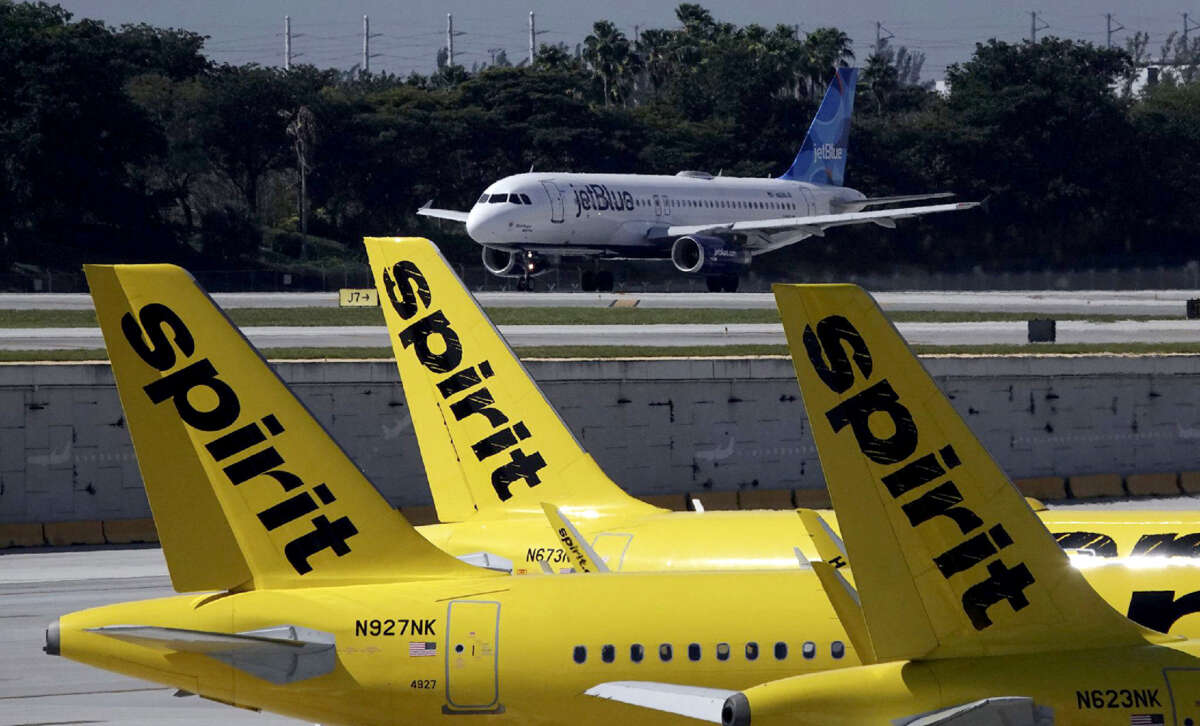Support justice-driven, accurate and transparent news — make a quick donation to Truthout today!
The Department of Justice (DOJ) has filed a lawsuit to block a merger between JetBlue Airways and Spirit Airlines in the latest antitrust move from the Biden administration.
DOJ officials are challenging the $3.8 billion deal on the grounds that it would further reduce competition and potentially cause a jump in air fares in a time of already heavy consolidation and soaring flight prices.
“If the acquisition is approved, JetBlue plans to abandon Spirit’s business model, remove seats from Spirit’s planes, and charge Spirit’s customers higher prices,” the lawsuit reads. “JetBlue’s plan would eliminate the unique competition that Spirit provides — and about half of all ultra-low-cost airline seats in the industry — and leave tens of millions of travelers to face higher fares and fewer options.”
Airline prices reached a high last year, jumping in the fall by 25 percent over the previous year as Americans prepared to travel for the winter holidays. Extreme consolidation in the airline industry has left customers with few choices but to book with a handful of airlines; just four airlines (American Airlines, Delta, United and Southwest) make up 80 percent of passenger air traffic.
The JetBlue-Spirit merger would even further increase consolidation. Currently, JetBlue is the sixth largest airline. Allowing it to merge with Spirit would make it the fifth largest airline, yielding JetBlue a market share of 10 percent.
JetBlue has argued that the merger would bring down prices, forcing other airlines to lower their fares to compete with the two lower-cost airlines. However, antitrust officials have said that the loss of Spirit Airlines’s independence would mean the loss of Spirit’s extra-low fares, and that JetBlue’s proposed changes to Spirit flights, like removing seats, would force the airline to raise prices to recoup lost fares.
Airline worker unions have been torn about the merger. The Association of Flight Attendants-Communications Workers of America, which represents about 5,600 Spirit flight attendants, has expressed support for the merger; Association of Flight Attendants president Sara Nelson wrote in a letter that she believes the merger would increase competition in the industry and that it was the “anti-merger, merger.”
However, the Transport Workers Union, which represents 6,800 JetBlue flight attendants, raised concerns in a separate letter last month about the potential anti-competitive effects of the merger. “We have yet to see a credible argument that a consolidated JetBlue/Spirit will enhance competition in the domestic airline industry,” the letter said. The union pointed out that hard-fought union victories could be lost by the merger.
Lawmakers have also sounded the alarm about the merger. In September, Sen. Elizabeth Warren (D-Massachusetts) wrote to Department of Transportation Secretary Pete Buttigieg urging him to block the deal, saying it would be in the public interest to do so.
She brought up concerns similar to those of Biden officials, saying that the current dominance of just a few airlines has already demonstrated the dangers of allowing a handful of airlines to control the industry.
“Airline industry competitiveness is in free fall, and consumers are feeling the consequences,” Warren wrote. Major airline “dominance has been achieved not primarily by offering better, more reliable service to passengers at lower fares but instead through a series of airline mega-mergers that have reduced service quality and increased fares.”
A terrifying moment. We appeal for your support.
In the last weeks, we have witnessed an authoritarian assault on communities in Minnesota and across the nation.
The need for truthful, grassroots reporting is urgent at this cataclysmic historical moment. Yet, Trump-aligned billionaires and other allies have taken over many legacy media outlets — the culmination of a decades-long campaign to place control of the narrative into the hands of the political right.
We refuse to let Trump’s blatant propaganda machine go unchecked. Untethered to corporate ownership or advertisers, Truthout remains fearless in our reporting and our determination to use journalism as a tool for justice.
But we need your help just to fund our basic expenses. Over 80 percent of Truthout’s funding comes from small individual donations from our community of readers, and over a third of our total budget is supported by recurring monthly donors.
Truthout has launched a fundraiser to add 500 new monthly donors in the next 9 days. Whether you can make a small monthly donation or a larger one-time gift, Truthout only works with your support.
